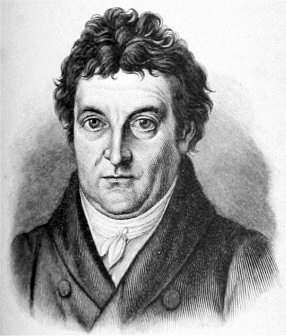Johann Gottlieb Fichte frasi celebri
Nicolao Merker
La missione del dotto, Citazioni sull'opera
La missione del dotto, lezione I, 1794
Origine: La missione del dotto, p. 12
Origine: La missione del dotto, p. 18
Frasi sull'et di Johann Gottlieb Fichte
Origine: La missione del dotto, p. 50
dalle Lezioni sulla missione del dotto, 1794
“Chiamo società la relazione reciproca degli esseri razionali.”
Origine: La missione del dotto, p. 22
“L'intellettuale è tale solo se considerato all'interno della società.”
Origine: La missione del dotto, p. 37
Nicolao Merker
La missione del dotto, Citazioni sull'opera
Johann Gottlieb Fichte Frasi e Citazioni
da Fondamento dell'intera dottrina della scienza, 1794 – GA, I/2 p. 394
“L'essenza interna ed assoluta di Dio viene alla luce come bellezza.”
Introduzione alla vita beata
Introduzione alla vita beata
Origine: La missione del dotto, p. 7
Origine: La missione del dotto, p. 12
Origine: La missione del dotto, p. 13
Origine: La missione del dotto, p. 13
Origine: La missione del dotto, p. 16
Origine: La missione del dotto, p. 17
Origine: La missione del dotto, p. 17
Origine: La missione del dotto, p. 26
“Noi siamo ancora al basso grado della semi-umanità, ovvero alla schiavitù.”
Origine: La missione del dotto, p. 32
Origine: La missione del dotto, p. 33-34
Origine: La missione del dotto, p. 39
“Nell'uomo esiste uno stimolo al sapere, e in particolare a ciò che gli torna utile.”
Origine: La missione del dotto, p. 58
Origine: La missione del dotto, p. 62
da una lettera alla moglie del 26 maggio 1794; citato nell'introduzione, p. IX
La missione del dotto, Citazioni sull'opera
da Discorsi alla nazione tedesca, IX discorso; citato in William Boyd, Storia dell'educazione occidentale, traduzione di Trieste Valdi, Armando Armando Editore, 1966
dalle Lezioni sulla missione del dotto, 1794
da Lo Stato di tutto il popolo, a cura di Nicolao Merker, Roma 1978
dalla Prima introduzione alla dottrina della scienza, 1797
“L'Io puro oppone nell'Io ad un io divisibile un non-io divisibile.”
dalla Dottrina della scienza, 1794
“L'umanità respinge il cieco caso e il potere del destino. Essa ha in mano il proprio destino.”
citato in Roger Garaudy, Karl Marx
“L'uomo può ciò che egli deve; e se dice: "Io non posso", segno è che non vuole.”
da Contributo per rettificare i giudizi del pubblico sulla Rivoluzione francese, 1793
III; 1943, p. 141
La missione del dotto
Johann Gottlieb Fichte: Frasi in inglese
Addresses to the German Nation (1807), Second Address : "The General Nature of the New Education". Chicago and London, The Open Court Publishing Company, 1922, p. 21
Paraphrased variant: The schools must fashion the person, and fashion him in such a way that he simply cannot will otherwise than what you wish him to will.
Origine: The Characteristics of the Present Age (1806), p. 16
Origine: The Characteristics of the Present Age (1806), p. 20
Addresses to the German Nation (1807), Second Address : "The General Nature of the New Education". Chicago and London, The Open Court Publishing Company, 1922, p. 20.
Johann Fichte Letter to Johanna Rahn from Johann Gottlieb Fichte's popular works: Memoir and The Nature of the Scholar<!--pp. 14-15--> https://archive.org/stream/johanngottlieb00fichuoft#page/14/mode/1up
Origine: The Vocation of Man (1800), P. Preuss, trans. (1987), p. 4
Consequences of the Difference p. 85
Addresses to the German Nation (Reden an die deutsche Nation) 1808, Fifth Address
Consequences of the Difference p. 75
Addresses to the German Nation (Reden an die deutsche Nation) 1808, Fifth Address
The Chief Difference Between The Germans And The Other Peoples Of Teutonic Descent p. 59
Addresses to the German Nation (Reden an die deutsche Nation) 1808, Fourth Address
General Nature of New Eduction p. 45
Addresses to the German Nation (Reden an die deutsche Nation) 1808, Third Address
“Education to true religion is the final task of the new education.”
General Nature of New Eduction p. 38
Addresses to the German Nation (Reden an die deutsche Nation) 1808, Third Address
General Nature of New Eduction contiunued p. 31
Addresses to the German Nation (Reden an die deutsche Nation) 1808, Third Address
General Nature of New Eduction p. 28
Addresses to the German Nation (Reden an die deutsche Nation) 1808, Second Address
General Nature of New Eduction p 21
Addresses to the German Nation (Reden an die deutsche Nation) 1808, Second Address
Introduction p. 9-10
Addresses to the German Nation (Reden an die deutsche Nation) 1808, First Address of Fourteen
Introduction p. 1
Addresses to the German Nation (Reden an die deutsche Nation) 1808, First Address of Fourteen
Origine: The Way Towards The Blessed Life or the Doctrine of Religion 1806, p. 78
Origine: The Way Towards The Blessed Life or the Doctrine of Religion 1806, P. 56
Origine: The Way Towards The Blessed Life or the Doctrine of Religion 1806, P. 26-27
Origine: The Way Towards The Blessed Life or the Doctrine of Religion 1806, P. 17
Origine: The Characteristics of the Present Age (1806), p. 268
Origine: The Characteristics of the Present Age (1806), p. 264
Origine: The Characteristics of the Present Age (1806), P. 213-214
Origine: The Characteristics of the Present Age (1806), p. 197
Origine: The Characteristics of the Present Age (1806), p. 192
Origine: The Characteristics of the Present Age (1806), p. 186
Origine: The Characteristics of the Present Age (1806), p. 168
Origine: The Characteristics of the Present Age (1806), p. 140
p, 122-123
The Characteristics of the Present Age (1806)
Origine: The Characteristics of the Present Age (1806), p. 105
